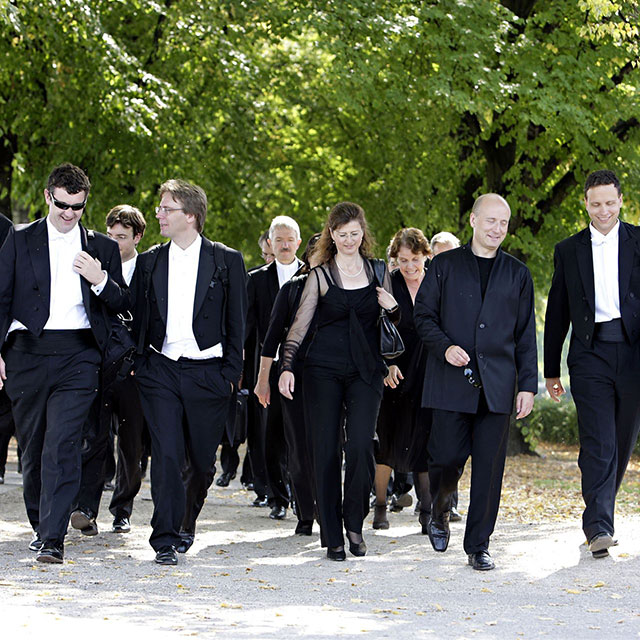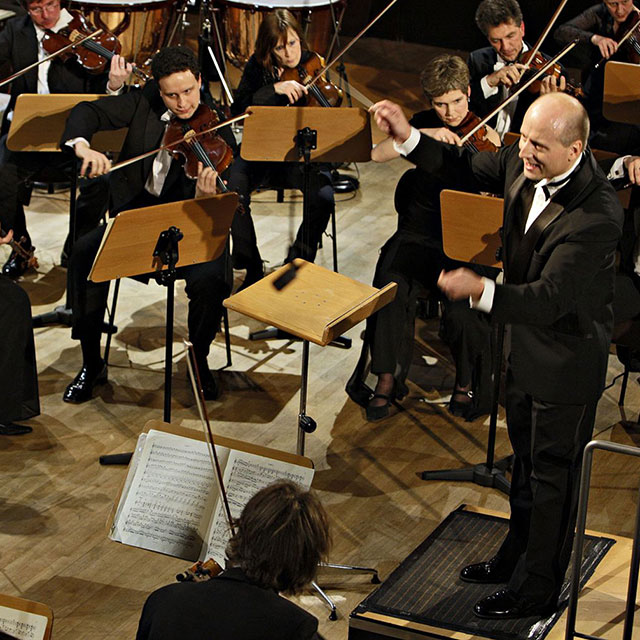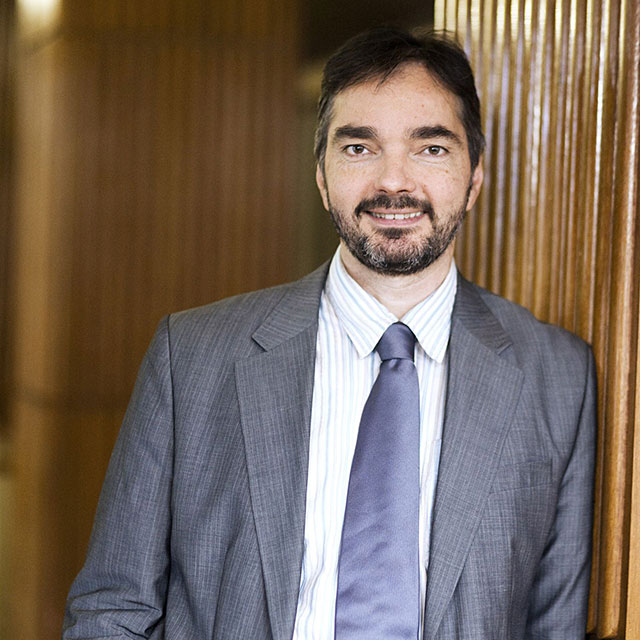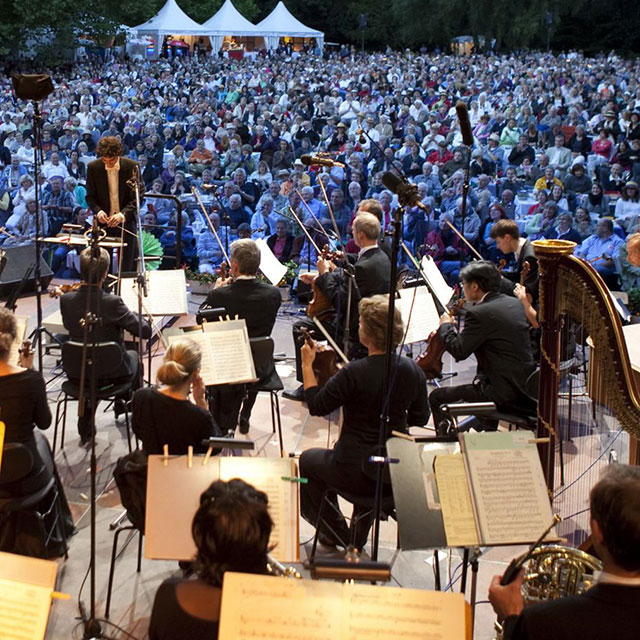The German Chamber Philharmonic Orchestra Bremen
There is probably no other professional world-class orchestra that would choose a rehearsal room in the midst of a school, especially not if the school is surrounded by a social hotspot. Against this background, it is even more surprising when you realize that the German Chamber Philharmonic Orchestra Bremen is on par with the Vienna Philharmonic or the New York Philharmonic Orchestra.
While the average German orchestras work with a grant component of up to 90 percent, the Bremen orchestra needs only a third of this sum. The rest of the required funds are generated by the company. Critical to this success is the fact that those 39 musicians are not in a traditional employment relationship. For many years now they have been the owners of their orchestra. Every musician is liable for his own personal assets if things should go bad one day, which they had already experienced in the past.
The corporate construct of the German Chamber Philharmonic Orchestra Bremen corresponds to the inner attitude of the musicians—an attitude that reflects a high degree of creativity and motivation, but also the desire for creative freedom. This wish has come true. The orchestra is working successfully and receives worldwide approval for its work: “The event of the summer,” cheered the New York Times after the orchestra played in New York. It also received positive reviews from the German SPIEGEL, the British BBC and the Japanese Ongaku no tomo. They all agreed on one thing: The German Chamber Philharmonic Orchestra Bremen is among the top ten in the world.
BEING THEIR OWN BOSS
For decades now, many young and talented people have competed in the German music world in the contest “Jugend musiziert” (Youth Making Music). In order to give the winners of this competition a chance to prepare for a later life in German cultural orchestras, the National Youth Orchestra was founded in 1969. After the first youths became adults, an additional orchestra, the Federal Student Orchestra “Young German Philharmonic,” was established in 1974.
In 1980, out of the Young German Philharmonic Orchestra, the German Chamber Philharmonic Orchestra Bremen came into being, but under a different name. The aim of the young and somewhat wild musicians was to create a cooperative in which they could act out their self-determination and creativity. These were attributes which were not found in the other, rather strict, hierarchy-dominated German orchestras. And still today, they are hard to find.
From the beginning it was clear: In order to achieve creativity, freedom and the determination for high-level performances, one must decline dependence on state subsidies. In the 80s, there were more than 160 orchestras in Germany which subsisted on public money. The ongoing battle for a subsidy share was, therefore, foreseeable, already before the founding of an orchestra.
The musicians also decided on the flexible business structure of the GbR. The construction as a GbR was risky; within only a few years, the shareholders dried up. Thus, the total debt in 1998 was 1.5 million Euros, and the personal assets of each of the 35 owners were at stake. However, in this case the GbR was positive because insolvency didn’t have to be applied immediately.
Each of the 35 musicians of the German Chamber Philharmonic Orchestra Bremen is also a partner in the orchestra. The members decided to get paid based on performance. Ever since then, a share of the total annual budget is calculated and a fixed salary based on performance is paid to the musicians. Those who work more days will likewise receive more money.
This requires an extraordinary atmosphere within the orchestra. External soloists and leading conductors participate. They do so even though their salaries are lower than the usual market rates. The reason: In the German Chamber Philharmonic Orchestra Bremen, they can grow exceptionally as musicians. Thus, the German Chamber Philharmonic Orchestra Bremen differs from most other orchestras. A study done by the organizational psychologist Richard Hackmann at Harvard University shows that the job satisfaction of an average orchestra musician levels with that of a prison guard.
Not only is the external organizational structure of the orchestra unusual, the internal structure of the German Chamber Philharmonic Orchestra Bremen has always been extraordinary. Until the mid-90s, the musicians were unusually hard on themselves. For example, once a year each musician had to undergo a review by all the other orchestra members. In a few cases, a musician had to leave due to stagnant artistic skills, decided by a two-thirds majority. “However, for reasons of psycho-hygiene we no longer conduct this mentally draining assessment,” says managing director Albert Schmitt. “Whoever received countervotes would ruminate over them for the rest of the year, trying to figure out where they came from. Today we only bring up the membership of individual musicians in obviously problematic cases.”
Despite this decision, conflicts are not swept under the carpet, but clarified at regular debriefings and supervisions. Thus, the German Chamber Philharmonic Orchestra Bremen differs from other orchestras, in which the musicians only partially communicate through their lawyers.
THE CONDUCTOR MAY TAKE A BREAK
Many business leaders like the classic model of the dominant leading conductor, whose direction all musicians (or their own employees) have to follow. The German Chamber Philharmonic Orchestra Bremen breaks with this image. One of the distinctive features of this orchestra is that it is one of the few orchestras worldwide performing without a conductor. Thus, the German Chamber Philharmonic Orchestra Bremen is not only very successful, but are also especially confident. “Basically, we are looking for the roots,” says managing director Albert Schmitt. “In the 17th century, all the small and medium-sized baroque orchestras played without a conductor. Back then it was more about playing music together. It was not until the Romantic period that orchestras became so big that they needed a conductor. In the second half of the 20th century, people like Austrian Nikolaus Harnoncourt made it their mission to dig out the old knowledge of historical performance. We are guided by this culture, from which orchestral music originated.”
When the German Chamber Philharmonic Orchestra Bremen decides to record a piece of music without a conductor, it does not mean that basic democracy follows, although part of this fundamental democracy is one of the founding ideas. After all, many of the musicians are influenced by the 60s. However, time and experience taught that this model works only in a limited manner. Possible outcomes, as well, are limited.
If the German Chamber Philharmonic Orchestra Bremen wants to achieve excellence, they need a constant interchange between democratic participation and functional, hierarchical structure. A hierarchical structure needs a conductor.
For example, all musicians have to know the partitur. This is the document that usually is in front of the conductor and that provides an understanding of the bigger picture. It tells everyone where things are headed and what role he or she plays. Throughout the performance, musicians come to the forefront at the relevant time. If this example is transferred to the classic business model, it would look like this: Each employee knows about the corporate strategy and all its aims. However, he or she also knows when to contribute exactly what to help the business reach its goals.
For the hierarchical content there is still the concertmaster and the vocal leaders of the other instrumental groups, who can take over management responsibilities. In a classic business, that would be the head of the department. He, for example, calls back the employees of the development department if they want to change the product at a time when the marketing department has already produced the TV commercials.
In particular, when working with external artists it becomes apparent that the German Chamber Philharmonic Orchestra Bremen has its own way of making music, which makes a big difference in the overall musical experience. In 2006 when the German Chamber Philharmonic Orchestra Bremen played with the Georgian violinist Lisa Batisahvili at the Beethoven Festival in Bonn, the conductor, Paavo Järvi, had to leave earlier for Cincinnati. His wife was about to give birth to their second child. Instead of finding a new conductor, the musicians decided to perform without one. Batisahvili, who knew Järvi, rang him, stating, “What kind of strange idea is that?”
Järvi assured, “They know what they’re doing!” So Batisahvili got involved in the experiment. This resulted in a standing ovation, during both the break and at the end of the concert. Batisahvili was awarded the Beethoven Ring of Bonn for this exceptional performance. She was so excited about this outstanding concert with the German Chamber Philharmonic Orchestra Bremen that she asked to play Beethoven’s Concerto for Violin one more time without a conductor. This time it was for a joint music CD which was later released by Sony Classical.
Despite these experiences, the German Chamber Philharmonic Orchestra Bremen does not want to go entirely without a conductor yet. The effort to rehearse musical pieces without a conductor is enormous. Also, a conductor offers musical inspiration through which the orchestra can develop. The type of maestro the German Chamber Philharmonic Orchestra Bremen is looking for has a natural authoritarian personality and is open to the ideas and skills of the entire orchestra. The current conductor, Paavo Järvi, calls himself, as a logical consequence, a “musical collaborator” or “chamber musician among chamber musicians.”
WORKING WITH THE NEXT GENERATION
Education is a deep-rooted need of the German Chamber Philharmonic Orchestra Bremen. The musicians not only have recognised the potential for change that lies within classical music, they are certain that educating young people is their social responsibility. Every single member of the orchestra invests at least ten percent of his or her worktime in working with children. A happy coincidence simplifies it: At the end of a long search for a suitable concert hall which the city of Bremen had promised the musicians, they found themselves standing in front of the Gesamtschule in Bremen-Ost Osterholz. As a social hotspot of the city, Bremen has people from 90 different nations living in it. To the surprise of the musicians, the former assembly hall of the school had exceptionally good acoustics. Third-party experts confirmed that with a little modification, this hall would provide excellent quality even for superior audio recordings. The German Chamber Philharmonic Orchestra Bremen chose to use the school as a rehearsal space and with this a remarkable experiment began.
Since the move to the Gesamtschule Bremen-Ost, there has been no morning rehearsal without students present. “We are fully booked many months in advance, both students of our school as well as students who travel to us with their teachers,” says Lisa Unterberg. Unterberg manages the “Future Lab” of the Chamber Philharmonic Orchestra, which has set itself the goal of promoting individuals through the help of music. This promotion ranges from management training right through to the educational work with children. “The children are prepared for half an hour before the rehearsal to ‘fuel’ their expectations. Then they sit down on stage with the musicians and pay attention to all the things they were told before,” Unterberg says enthusiastically. “This will ensure—depending on age—that they sit quietly for 30 to 60 minutes. It is almost as if they would absorb the high concentration of the musicians.” Following this experience, the children are given time to reflect and discuss what they just witnessed.
In addition to this offer, there are many more projects in which the children can participate more actively. Once a year there is the great “Neighbourhood Opera” performance. This musical gem is for children, adolescents and adults from Bremen-Osterholz to perform in. Another project is “Melody of Life.” This performance allows children to get life experiences about contemporary issues such as lovesickness, the death of a mother or other relationship issues in a musical format. In the final version of their own song, the children are accompanied by the entire orchestra. How many children, indeed, at such a young age, have the experience of performing their own creation with a world-class orchestra?
The very fact that students always see musicians practicing in the morning before school and after class has an educational value and serves as a role model. Regular work is not common in many families of this neighbourhood. After school, some students sit down in the foyer of the concert hall and do their homework. At home, it would be impossible for them.
One of the highlights of the German Chamber Philharmonic Orchestra Bremen is the Beethoven project for which it received not only a wide variety of recording awards, but worldwide praise from the media. The complete cycle of all nine Beethoven symphonies has been listed among others in Paris, at the Salzburg Festival and at the Beethoven Festival in Bonn. “Deutsche Welle” (“German Wave,” TV program) even made a movie about this project, which was broadcast worldwide. “We could not have recorded the music without its environment in which we perform. Even Beethoven didn’t have an especially happy childhood. This is what rings through.” So the musicians bow to the gift and its environment.
WORKING WITH COMPANIES
When the German Chamber Philharmonic Orchestra Bremen experienced its largest financial crisis in 1998 with a deficit of 1.5 million Euros, the managing director, Albert Schmitt, after a few failed attempts, made a decisive decision. Instead of getting another external manager, he moved from the orchestra into management.
His strategy to master his way out of the crisis consisted of two main aspects. First, the orchestra needed to change to a “real” business. Second, the German Chamber Philharmonic Orchestra Bremen would have to be developed as a brand. For the practical implementation of both plans, Schmitt hired external professionals.
To support the musicians throughout their performance and expand this concept even further, Schmitt hired the organisational expert Christian Scholz in 1999. Scholz started an organizational development process with the orchestra. Throughout this process, a pattern emerged which indicated why the German Chamber Philharmonic Orchestra Bremen could, on a musical level, enjoy high achievement. Scholz extracted ten values from the musicians which the orchestra so far followed, consciously or unconsciously. Since those values were sometimes contradictory, one thing became evident: It was all about the tension between opposites which needed to be upheld to ensure high performance in the long term.
These ten values fell into five pairs:
1. Need & Meaning
2. Hierarchy & Democracy
3. Perfection & Adventure
4. Energy & Concentration
5. Success & Fun
Out of the internal organizational development process, a management training emerged with the name “5 Seconds Model.” “Second” in this context does not mean the classic time unit, but the musical definition of the second.
Companies can read the details of this model in a published book by Schmitt and Scholz, or experience them close-up in collaboration with the orchestra. To do so, companies can hire the German Chamber Philharmonic Orchestra Bremen for a whole-day workshop. This workshop starts the night before when the management team of interested customers visits the German Chamber Philharmonic Orchestra Bremen. After the concert, managers as well as musicians touch base for the first time. Every musician will be assigned to one of the managers as a kind of sponsor.
For this collaboration, the orchestra accepts only companies that claim to have a high-performance team or that want to have one. “This is not just an easy team-building measure. We do not confine ourselves to show the boss how to conduct,” says CEO Schmitt, indicating the need to transcend the newly created copies of musical management training teams which are available these days. “We are a high-performance team and we convey our recipe for success. Hence, companies are capable of long-term performance.”
That the German Chamber Philharmonic Orchestra Bremen can survive at its long-term, high-performance level becomes evident by the ever-growing demand of music lovers. Three of the subscriptions to the German Chamber Philharmonic Orchestra Bremen are fully booked already, and the fourth series in Hansestadt is ready to be opened next year.
COMPANY FACTS
The German Chamber Philharmonic Orchestra Bremen was founded in 1980 under the name Chamber Orchestra of the Young German Philharmonic (Kammerorchester der Jungen Deutschen Philharmonie). Its institution as a professional chamber orchestra in Frankfurt followed in 1987. In 1992, the Chamber Orchestra relocated to Bremen. This happened after the City of Frankfurt wanted to support the musicians only under certain conditions which had resulted in the loss of identity. After many years of searching, the German Chamber Philharmonic Orchestra Bremen found, in 2007, its “forever home” in the Gesamtschule Bremen-Ost.
In 2007, the German Chamber Philharmonic Orchestra Bremen received the Future Award “Best Social Innovation” for its decision to move to the social focal point. This was followed by the “Inventio” Award for the area “Responsibility for the music within the society” in 2008. This award went to the CEO, Albert Schmitt. In the same year the German Chamber Philharmonic Orchestra Bremen was awarded a special prize: the German Founder’s Prize for outstanding entrepreneurial performance, a joint initiative of the ZDF, the Stern (Der Stern), the banks and Porsche.
In 2009, the orchestra received three of the seven ECHO Awards of the music industry. In the same year, the orchestra received the Certificate of Honour of the Annual Award of the German Record Critics. It marked the first time this award was given to an orchestra. One year later, the artistic director, Paavo Järvi, received the ECHO Classic Award as Conductor of the Year 2010.
In the meantime, the Future Laboratory was appointed by the Minister of State, Bernd Neumann, as a model project.





